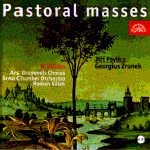Jirí Pavlica’s Missa Brevis is a work whose simplified, old-fashioned atmosphere will have immediate appeal for listeners outside of the basic classical audience. Its accessibility and charm makes it a sure bet for community choral societies and local church choirs. The Kyrie, for example, opens with a martial fanfare, then quickly shifts to a gently rising figure with a lovely soprano and baritone duet. There are some very intimate moments among the larger-scale settings, particularly in the Credo and Sanctus, and I think the ghost of Copland must have entered the room while Pavlica was writing the Benedictus. The vocal soloists throughout are up to the task, providing tasteful lines and appealing sounds. Roman Válek gets very effective performances from the Brno Chamber Orchestra and the Ars Brunensis Chorus.
Georgius Zrunek’s Missa prima pro festis Natalitiis (neither of these works has Pastoral in the title–the old-fashioned term “Pastoral Masses” on the cover can refer to any Christmas Mass) is a fun discovery, not least because of the way Zrunek infuses Czech folk melodies and dance rhythms into his mass setting. Pavlica’s own Hradištan (one of today’s leading Moravian dulcimer ensembles) joins the other two ensembles here. Zrunek’s imaginative use of folk instruments adds to the interest of this very charming work, especially the string drone and recorder in the Kyrie and the Jew’s Harp in the Benedictus.
The various vocal soloists are mostly fine, although the bass tends to be a bit over the top, and two of the three boy sopranos have intonation trouble in the Gloria. Pavlica is the conductor for this piece, and while the folk dances work well, the slow sections tend to plod too heavily. The recording is a bit distant, with some restricted high end evident in both brass and strings. Both pieces interpolate Latin and vernacular texts, but unfortunately there are no texts printed in the booklet.
































